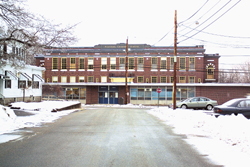Most of the people who call Andrew Laird are just looking for reassurance that they’re not crazy.
“Many of the people who call us are at the point where they’re wondering if they’re going crazy – most people just want to know they’re not losing it,” said Laird, a Glocester resident.
Enter The Rhode Island Paranormal Research Group, a 20-year-old organization based in North Scituate. The group is dedicated to investigating and researching reports of paranormal phenomenon and helping others understand and cope with the paranormal.
The 15-member group, which accepts no payment for their services, gets between six and seven inquiries per month. They normally conduct two full-scale investigations in the same time frame.
“Ninety percent of the time, we find the cause of it right there during the preliminary interview,” said Laird, founder and director of TRIPRG “There’s a natural reason for it happening – an electrical short in the house, or just plain hysteria. A lot of time people hear or see what they want to see.”
When that happens, the group informs the person for whom they’re investigating that they can’t find anything and that their mind could be playing tricks on them.
Maggie Florio, the group’s assistant director and secretary, became involved with paranormal research two years ago, though she’s been interested in the field since she was a child. Her first connection with the group came after she said she had a paranormal experience that she needed verified.
“I thought it was all in my mind,” she said. When she called TRIPRG, Laird said he verified the ghost she had likely encountered.
A large percentage of the calls TRIPRG receives are reports of audible sounds in the home.
“Someone is alone in their house and they hear noises they can’t explain – like they’re in bed at night and hear footsteps,” Laird said, “or a television or lamp keeps turning on and off.”
When TRIPRG is called in, they do a preliminary investigation. If they find cause to continue the inquiry, they assemble a full-scale investigation. The process, Laird said, is complex. The typical investigation involves research of the property, its previous residents and their history – including land, birth and death records. On-site investigation uses a variety of electronic-sensing equipment, including Geiger counters, thermometers, night-vision equipment, video cameras, and gauss meters, which measure electrostatic and electromagnetic levels, which are often regarded as indicators of paranormal activity.
“There’s a lot of science involved,” Laird said. “We’re talking about physics, psychology and forensics.” Many times, investigation scenes can resemble forensic crime scenes, he added.
During the investigations, the group sometimes uses members called “sensitives” to glean more information. Sensitives are people with confirmed psychic abilities, Laird said. The team’s senior sensitive, Donna Delgado, is correct nine out of 10 times, Laird said.
Once the site investigation is complete, the group has evidence meetings, at which team members weigh the data collected from the site.
“We rip each other apart at those meetings,” Laird said.
Laird said even when paranormal entities – ghosts – are detected, people should have little reason to fear them.
“A lot of times these ghosts are happy where they are and they’re not causing problems,” Laird said. “Then we counsel clients that instead of being afraid of a paranormal, they can cohabitate with it. It’s very rare that we have to try and make (the paranormal) leave.”
Roughly 65 percent of ghosts are on a “Casper the Friendly Ghost” level, Laird said.
If the work sounds eerie, members would agree.
“Oh yes, we’re human, we get scared,” Florio said. “But the thing is when we’re on an investigation, we’re never alone and that makes a big difference.”
Members of the group participate in speaking engagements at schools, historical societies and other venues. When they encounter people skeptical of a haunting, Laird said he simply presents the evidence collected and asks them to at least look at it.
“And if you can’t disprove it, I ask them to at least say ‘maybe,’” he said.
Florio said the group doesn’t set out looking for ghosts, instead seeking the cause of the activity at a location.
“I think it’s healthy to be skeptical,” Florio said. Members of the group try to maintain a skeptical attitude when launching an investigation, she said.
“I’m not looking for ghosts; I’m looking for something other than ghosts to be causing whatever’s happening. It’s my job to either prove it haunted or not haunted.
“But if you show evidence like a tape to someone who refuses to believe in ghosts, they’re not going to believe it. A lot of people don’t believe something until it happens to them personally.”











